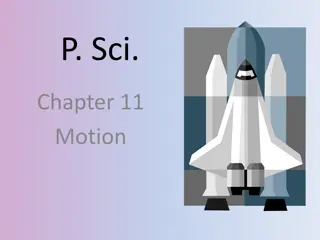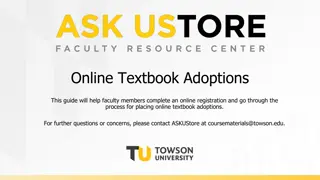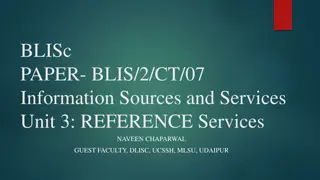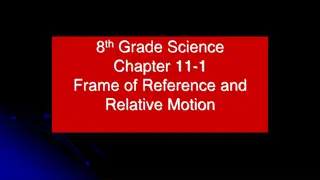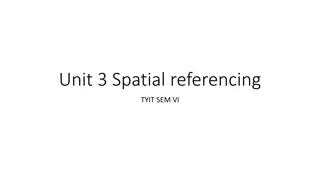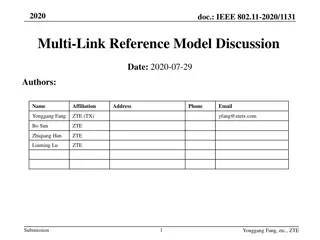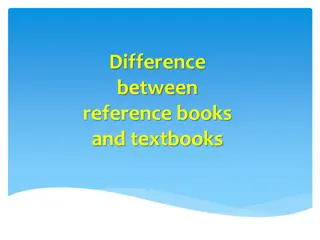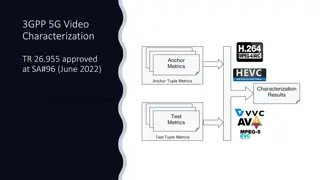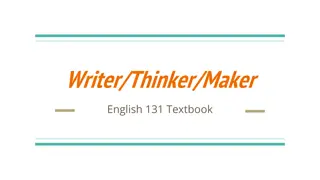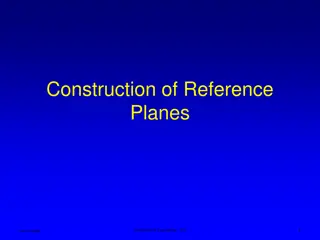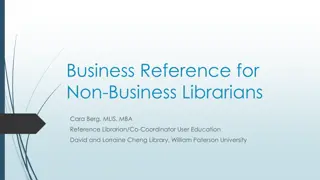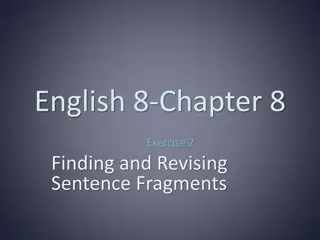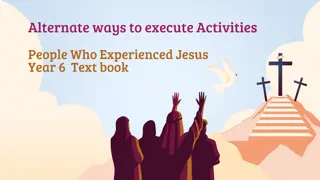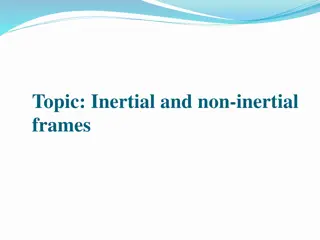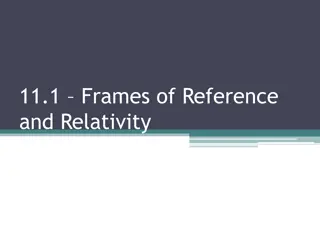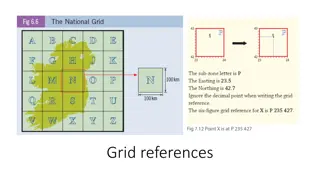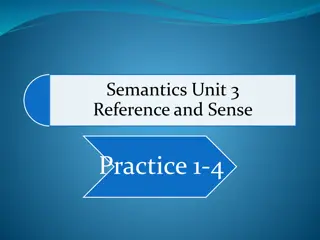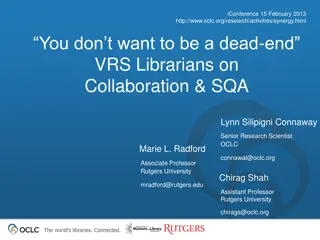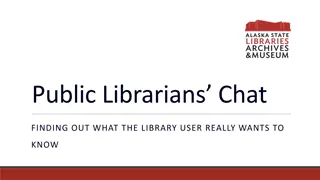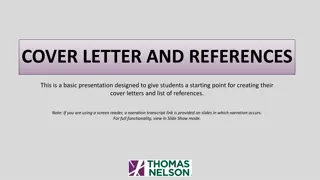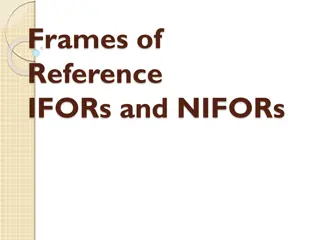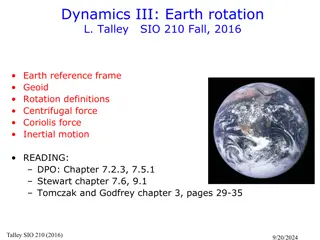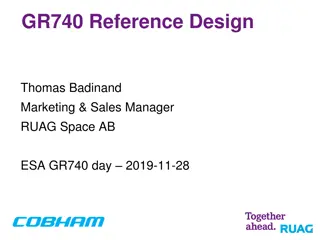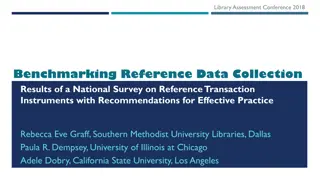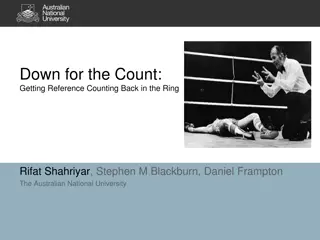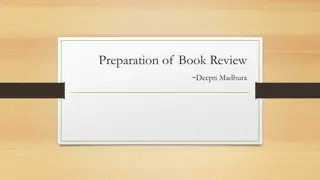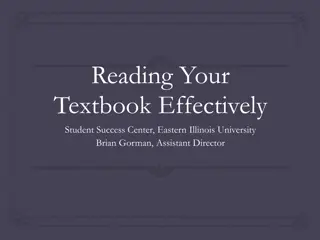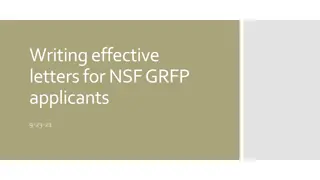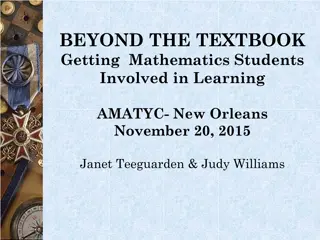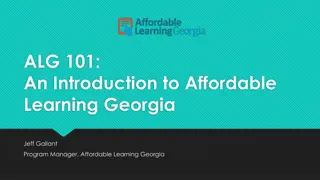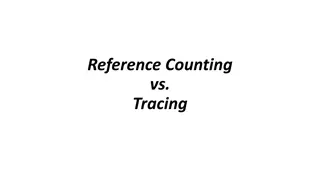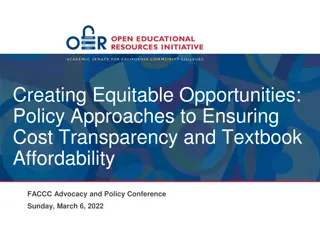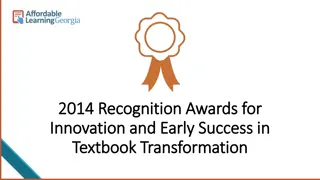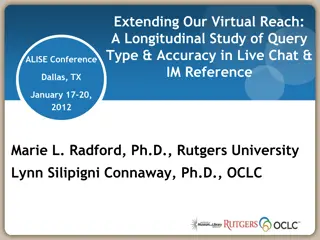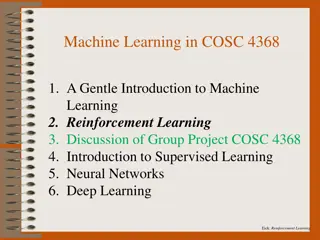textbook$ Wallbanger (The Cocktail Series Book 1) [KINDLE EBOOK EPUB]
textbook$ Wallbanger (The Cocktail Series Book 1) [KINDLE EBOOK EPUB]
2 views • 1 slides
Understanding Motion: Distance, Displacement, and Frames of Reference
This educational content delves into the concepts of motion, specifically distance, displacement, and frames of reference. It distinguishes between distance traveled and displacement, illustrating with examples of car journeys and runner movements. The importance of frames of reference in accurately
0 views • 45 slides
Online Textbook Adoptions Guide for Faculty Members
This guide provides step-by-step instructions for faculty members to register online, create adoption profiles, and place textbook adoptions through the Towson University online store. It includes details on creating an account, changing passwords, completing adoption profiles, and placing adoptions
0 views • 11 slides
Importance of Reference Services in Libraries
Reference services in libraries play a crucial role in connecting users with the information they need, promoting the use of library collections. This service assists users in various queries and requests, ranging from simple fact-finding to complex research. Reference functions include responsive s
1 views • 19 slides
Understanding Motion: Frames of Reference and Relative Motion
Motion is defined as a change in position over time. To describe motion accurately, one needs to understand frames of reference and relative motion. Frames of reference are systems of objects used to determine if something is in motion, while relative motion involves movement in relation to a refere
3 views • 14 slides
Understanding Spatial Referencing Systems for Mapping
Spatial reference systems play a crucial role in defining geographic parameters and coordinate systems for mapping. They consist of components like orientation, latitude, longitude, and elevation, which help in representing spatial properties on maps. Reference surfaces such as the Geoid and ellipso
3 views • 13 slides
IEEE 802.11-2020 Multi-Link Reference Model Discussion
This contribution discusses the reference model to support multi-link operation in IEEE 802.11be and proposes architecture reference models to support multi-link devices. It covers aspects such as baseline architecture reference models, logical entities in different layers, Multi-Link Device (MLD) f
1 views • 19 slides
Understanding the Varied Roles of Reference Books and Textbooks
Reference books and textbooks serve distinct purposes in education. Reference books contain specialized information like encyclopedias, dictionaries, etc., while textbooks provide structured instruction for various subjects in line with educational requirements.
0 views • 4 slides
5G Video Characterization: Reference Sequences and Metrics
Scenarios and anchor generation for various video codecs used in 5G services are detailed, along with reference sequences for different applications like Full HD streaming, 4K-TV, screen content, and more. Tools and repositories for accessing reference sequences are provided, and metrics for evaluat
0 views • 15 slides
English 131 Textbook: A Comprehensive Guide to Writing, Reading, and Argumentation
This English 131 textbook is divided into six parts focusing on various aspects of writing, reading, and argumentation. It covers defining rhetoric, genre awareness, reading skills, conducting research, argumentation, and strategies for drafting and revising. The textbook provides tools and resource
0 views • 4 slides
Introduction to Construction of Reference Planes in Engineering
Explore the process of constructing reference planes in engineering, including principal planes, creating reference planes, reference features, and how to uniquely define a plane. Reference planes are essential for creating new sketches and carrying out feature operations in engineering design.
0 views • 12 slides
Business Reference Resources for Non-Business Librarians
Access a variety of business reference tools tailored for non-business librarians, including databases for articles on business topics, company and industry data sources, primary and secondary sources on taxation of exempt organizations, and demographic data resources. Connect with a reference libra
0 views • 7 slides
Identify and Revise Sentence Fragments in English Textbook Exercise
Practice identifying and correcting sentence fragments in the English textbook exercise presented. Learn to differentiate between complete sentences and fragments, and improve your writing skills by revising incomplete sentences into coherent, grammatically correct structures.
0 views • 32 slides
Exploring Activities of People Who Experienced Jesus in Year 6 Textbook
Delve into the lessons taught in the Year 6 Textbook about Jesus such as the Lamb of God, overcoming temptations, proclaiming the Kingdom of God, and more. Engage in alternate ways to execute activities through interactive and thought-provoking methods. Discover how to bring joy to others, understan
0 views • 19 slides
Understanding Inertial and Non-Inertial Frames of Reference
Frames of reference play a crucial role in describing and observing motion. In physics, there are two main types of frames of reference: inertial and non-inertial. An inertial frame is one that moves at a constant velocity, where Newton's first law holds true. Such frames have specific characteristi
0 views • 14 slides
Understanding Frames of Reference and Relativity
Explore the concept of frames of reference in physics, distinguishing between inertial and non-inertial frames. Learn about the laws of Newtonian mechanics, guidelines for inertial frames of reference, and delve into the intriguing realm of the Special Theory of Relativity with engaging visual aids
0 views • 35 slides
Grid References and Archaeological Sites Answer Key
This content provides answers to grid references for various archaeological sites, including a four-figure grid reference and a six-figure grid reference. The images and descriptions help in understanding the locations of sites like Holy Well, Cairn, Megalithic Tomb, Standing Stone, and more. The so
0 views • 5 slides
Understanding Semantics: Reference and Sense Explained
Explore the concepts of reference and sense in semantics through examples and practice questions. Learn how language expressions refer to things in the world and understand the distinction between the referent and the reference. Delve into variable and constant reference with practical scenarios to
0 views • 8 slides
Insights on Virtual Reference Services and Collaboration in Libraries
Explore the findings from interviews with VRS librarians regarding collaboration, difficult reference encounters within and outside librarians' expertise, and the importance of sustainable collaboration between Virtual Reference and Social Q&A sites for creating new library services. The research fo
0 views • 11 slides
Enhancing Reference Services: Skills and Guidelines for Library Professionals
Explore the essence of conducting reference interviews, understanding the advantages and disadvantages, essential personal and interpersonal skills, and guidelines for behavioral performance in providing reference and information services. Delve into the remote reference service concept, the integra
0 views • 23 slides
Comprehensive Guide for Cover Letters, References, and Job Applications
This comprehensive guide provides students with a starting point for creating effective cover letters and reference lists. It includes tips on structuring cover letters, examples for reference pages, and guidance on personal and professional references. The presentation also offers contact informati
0 views • 7 slides
Understanding Reference and Inference in Linguistics
Discussing deixis, the act of reference in language is explained as a way for speakers and writers to enable listeners and readers to identify entities. Reference involves using proper nouns, phrases, pronouns, and even invented names. Inference plays a crucial role in successful acts of reference,
0 views • 11 slides
Understanding Frames of Reference in Physics
Explore the concept of Frames of Reference (IFORs and NIFORs) in physics, including laws of motion, Inertial and Non-Inertial Frames, Fictitious Forces, and examples like the accelerometer in NIFOR. Learn how these concepts help explain motion and forces in different reference frames.
0 views • 12 slides
Understanding Earth Rotation and its Reference Frame
Exploring the dynamics of Earth's rotation, this content delves into the geoid as a reference frame for pressure calculations, rotating coordinates, and the concept of centripetal and centrifugal forces. Learn about the Earth's rotating reference frame, angular velocity, and how to calculate speed a
0 views • 19 slides
Development of GR740 Single Board Computer Reference Design by RUAG Space and Partners
RUAG Space collaborates with Gaisler and other partners in the development of a GR740-based single board computer reference design funded by ESA. The project aims to create an advanced technology platform for future space projects, leveraging RUAG's expertise in electronics and digital computers for
0 views • 12 slides
ESA Validation Approach & Fiducial Reference Measurements Overview
The validation approach outlined by ESA focuses on providing reliable products with documented error bars and enhancing algorithm and sensor quality. A validation program consists of various activities, including validation against precise reference measurements, in-situ validation, inter-satellite
0 views • 8 slides
Benchmarking Reference Data Collection in Libraries: Insights from Library Assessment Conference 2018
Explore the results of a national survey on reference transaction instruments presented at the Library Assessment Conference 2018. Discover the importance of capturing reference interactions, comparing studies, and methods of data collection in libraries. Understand the changing landscape of referen
0 views • 19 slides
Reviving Reference Counting: A Comprehensive Analysis
Background garbage collection techniques like tracing and reference counting are crucial in managing memory in different settings. This article delves into the historical context, advantages, disadvantages, and challenges of reference counting in garbage collection. It presents an in-depth analysis
0 views • 35 slides
Essential Elements of Book Reviews and Textbook Characteristics
Understanding the significance of book reviews and textbook characteristics is vital for both readers and educators. A book review is more than a mere summary; it involves critical analysis. Similarly, a good textbook should be well-written, psychologically planned, unbiased, and include real-life e
0 views • 10 slides
Exploring Strategies to Lower Textbook Costs at West Valley College
Discover how West Valley College is collaborating to reduce the expenses of textbooks for students. Insights on determining textbook prices, faculty preferences, student choices, and revenue allocation are provided, shedding light on the efforts to make course materials more affordable and accessibl
0 views • 20 slides
Effective Textbook Reading Strategies for Academic Success
Learn essential strategies to improve your textbook reading skills, including pre-assessment techniques, common reading myths, and understanding the return on investment in your college education. Discover how to combat challenges such as wandering thoughts, difficulty understanding complex texts, a
0 views • 18 slides
Guidelines for NSF GRFP Reference Letters Submission
Discover key instructions for submitting reference letters efficiently for the NSF Graduate Research Fellowship Program (GRFP). Learn about the requirements, deadlines, and detailed guidelines for reference writers and applicants to ensure a successful application process.
0 views • 18 slides
Engaging Mathematics Students Beyond the Textbook
Explore innovative methods to involve mathematics students in active learning beyond traditional textbooks. The session delves into practical problem-solving activities, contrasting textbook content with real-life applications, and fostering collaborative learning environments. Embrace a dynamic app
0 views • 44 slides
Promoting Textbook Affordability Through Open Educational Resources
Affordable Learning Georgia, led by Program Manager Jeff Gallant, has been at the forefront of addressing rising textbook costs since 2004. Initiatives include the development of open textbooks, faculty training on open educational resources, and collaboration with institutions like GALILEO to promo
0 views • 17 slides
Comparison of Reference Counting vs. Tracing Garbage Collection Algorithms
Understanding the differences between reference counting and tracing garbage collection algorithms, their challenges, and design spaces. Discussing topics such as storing object counts, maximum reference count distribution, overflow scenarios, and methods for maintaining counts in reference counting
0 views • 23 slides
Promoting Textbook Affordability in Community Colleges
Explore existing policies and regulations aimed at promoting textbook affordability and transparency in community colleges. Learn about the initiatives, investments, and considerations necessary to ensure cost-effective access to course materials for students. Gain insights from expert presenters an
0 views • 29 slides
Comparison of Textbook Provision Policies in African Countries
The comparison reveals variations in textbook provision policies among African countries like Liberia, Nigeria, Gambia, Uganda, Sudan, and Ethiopia. It outlines the status of textbooks being provided free or paid for by students, the ratio of textbooks per subject, financing sources, and historical
1 views • 16 slides
Innovators in Textbook Transformation 2014 Recognition Awards
A showcase of educators recognized for their innovative approaches in transforming textbook use. Dr. Sanjeev Arora, Dr. Peggy Brickman, Dr. Katie Brkich, Dr. Susan Burran, Dr. Andrew Edelman, and Dr. Hassan El-Najjar have successfully implemented free or adapted OpenStax College textbooks, leading t
0 views • 25 slides
Extending Our Virtual Reach: Longitudinal Study of Query Type & Accuracy in Live Chat & IM Reference
This study, conducted from 2004 to 2010, explores different types of virtual reference questions such as Subject Search, Ready Reference, and Procedural inquiries. It discusses the evolution of virtual reference services and the accuracy of responses in live chat and instant messaging. The research
0 views • 33 slides
Overview of Reinforcement Learning in COSC 4368
A gentle introduction to reinforcement learning within the COSC 4368 course, covering topics such as Bellman Update, Temporal Difference Learning, Q-Learning, and policy selection. The material is spread across various chapters of the textbook, focusing on maximizing rewards in state space framework
0 views • 51 slides
![textbook$ Wallbanger (The Cocktail Series Book 1) [KINDLE EBOOK EPUB]](/thumb/9895/textbook-wallbanger-the-cocktail-series-book-1-kindle-ebook-epub.jpg)
